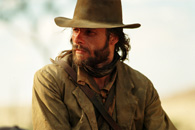
| Saturn Will Not Sleep - Discovery (Official Video) |

|
| home | movie reviews | features | sov horror | about | forum |
The Proposition A-
Year Released: 2005 (USA: 2006)
Calling The Proposition the best western since Unforgiven is a bit disingenuous, since the genre entered a seemingly permanent coma after Clint Eastwood's seminal swan song. At least, in the theaters it did. Fans of HBO know better, however, for the brilliant, savage Deadwood has kept the western's fluttering pulse alive on the small screen even as it slowly died on the big one. The Proposition flows majestically from that show's firmly held beliefs that civilization is just thin pretense hiding a heart of pure Darwinian bestiality. Director John Hillcoat sets his meditation in the heart of the Australian outback, where British subjects toiled to carve homes and lives out of a countryside that offered nothing but slow, painful death. No one is more aware of this than Captain Stanley (Ray Winstone), commander of the local garrison charged with bringing order to the territory. His primary targets are the Burns brothers: Charlie (Guy Pearce), Mikey (Richard Wilson), and Arthur (Danny Huston), Irish immigrants whose murderous spree of terror has shocked even the most hard-bitten denizens of an already inhospitable land. Stanley has some strong ideas about law and order, and takes it upon himself to pay the price that they demand. He builds a refuge in a modest ranch estate, framed by tasteful gardens and a shy wife (Emily Watson) who pours tea for him at the end of his weary day. For the sake of what she represents, he is willing to stain his soul crimson, and he gets his chance when his men finally bring Charlie and Mikey into custody. Though they're fine catches, it's the eldest Arthur who is the real prize (and, in Stanley's opinion, the root of the brothers' lawlessness). So he makes Charlie a Faustian bargain: find and slay Arthur, and Mikey will go free. Fail to bring in Arthur's corpse, and Mikey swings for their collective crimes. Stanley's twisted use of such coercion forms the crux of The Proposition's moral subtext. He equates the lives of his adversaries in terms of commerce, believing that Charlie's love for Mikey outweighs his reluctance to harm Arthur. And with Arthur gone, the territory will move one step closer to a place where gardens and tea parties could conceivably thrive. Thus, civilization is bought in "civilized" terms: the blood is off Stanley's hands, foisted onto Charlie, who, as the ostensible criminal, has more than earned such torment. Winstone's fine, subtle performance shows the cost of such hypocrisy; his haunted eyes betray a heavy burden, which he is happy to carry for the sake of his fragile homestead oasis. Of course, the blood can't help but seep in regardless, as the very act of protecting a better life slowly becomes a threat to its existence. The flip side of this equation is Charlie, driven both by the weight of his dilemma, and by the nagging suspicion that he and his brothers might truly deserve what's coming to them. They aren't immune to the lure of a better life themselves: the cave that forms their hideout is marked by desks, newspaper clippings, and even books stacked on crude shelves. But here it seems even more of a facade, surrounded by inhospitable desert and aborigines who can run a spear through you before you even know they're there. While the Burnses are more honest about the reality in which they live, they too pine for the trappings that their adversary has embraced more forcefully. Charlie's unspoken mental agonies find fertile ground in another terrific turn by Pearce, who can say more in two minutes of silence than most actors can with an entire script of monologue. Hillcoat develops all of this in slow measured paces, harnessing the themes with heavy yet undeniably striking visual motifs. The outback has rarely looked so gorgeous or merciless as it does in his eye, and the brief bursts of horrendous violence are punctuated by indelible cues such as whisky bottles trailing in a wide path behind an isolated bar, or clouds of flies settling on the unmoving backs of homesteaders. The actors' etched faces speak to ugly, harsh lives, answering only to the law of the jungle and tenuous ties of kinship. That society eventually came to flourish in this hell was a result of unspeakable sacrifice that such men and women endured only because they had no choice. Hillcoat's methodical work creates an indelible image of their pain, struggle, and betrayal, of the paths they walked and the ideals they buried along with their dead. Aided by an uncompromising script by Nick Cave (of Bad Seeds fame), he adds a darkly brilliant chapter to a genre whose creative spirit hangs by the thinnest of threads. The Proposition's grim truths say much about the era we live in: an era marked by roadside bombings, nuclear proliferation, and grotesque bloodshed visible out of the corner of every eye. Looking at it reminds us that such brutality has always existed and stubbornly remains in our core, no matter how many genteel veneers we try to pile on top of it. Review published 05.08.2006.
|

|
| home | movie reviews | features | sov horror | about | forum |
| This site was previously at flipsidemovies.com from 2000 to 2008. |
|
contact | copyright | privacy | links | sitemap
Flipside Movie Emporium (FlipsideArchive.com)
|